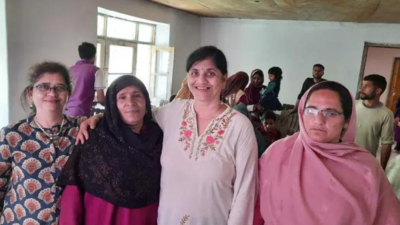- News
- City News
- vadodara News
- 'Madam, aapka project bandh to nahi karoge na?': Kashmiri women plead job creator not to shut down project in Gujarat's Vadodara
Trending
'Madam, aapka project bandh to nahi karoge na?': Kashmiri women plead job creator not to shut down project in Gujarat's Vadodara
Following the Pahalgam terror attack, Swati Bedekar of Vatsalya Foundation received worried calls from Kashmiri women fearing the closure of her sanitary napkin project. Started in 2022, the initiative empowers women in remote villages by providing livelihood through manufacturing biodegradable sanitary napkins.
VADODARA: Minutes after the terror attack in Pahalgam on April 22, Vadodara's Swati Bedekar received a call from a panicked woman from a tiny village in Baramulla district. "Madam, aapka project bandh to nahi karoge na?" (Madam, hope you are not shutting down your project?). Over the last two days, she was flooded with similar desperate pleas by women in Kashmir.
They were scared that they would lose their livelihood of making sanitary napkins, an initiative taken by Bedekar three years ago to make women in the valley self-reliant.
"In the last two days, I received several such calls from the women staying in the valley who are concerned that the livelihood project I am operating in Kashmir may come to a halt. Many women there are dependent on it as it helps them earn their bread," Bedekar, who runs Vatsalya Foundation in Vadodara, told TOI.
Though she is assuring the women that nothing would change, Bedekar is in a dilemma. "I worked with hundreds of Kashmiri women in the valley and I have to train many more. But after the terror attack in Pahalgam, I am nervous and unsure of visiting Kashmir soon. My family too asked me not to step in J&K for a while," Bedekar said.
The women began using the sanitary napkins and also made decent money by selling them in the adjacent villages. Such was the success of the initiative that 10 more units were opened in Kupwara, Uri-Baramulla, Handwara, Bandipore, Srinagar, Kishtwar, Anantnag, and Pulwama between 2022 and 2024. Bedekar is setting up more such units with the help of local administration and the Indian army that provides her security whenever required.
"A major part of the valley is covered with snow for almost six months in a year and hence there is little employment for the locals. The women earning from the units aren't just supporting their families financially but also funding the education of their daughters," Bedekar added.
"I returned from Kashmir just a few days ago and was preparing for my next trip to the valley in May. The Kashmiri women from several districts are assuring me safety and insisting that I continue with my projects there," Bedekar said.

About the Author
Tushar TereEnd of Article
Follow Us On Social Media









